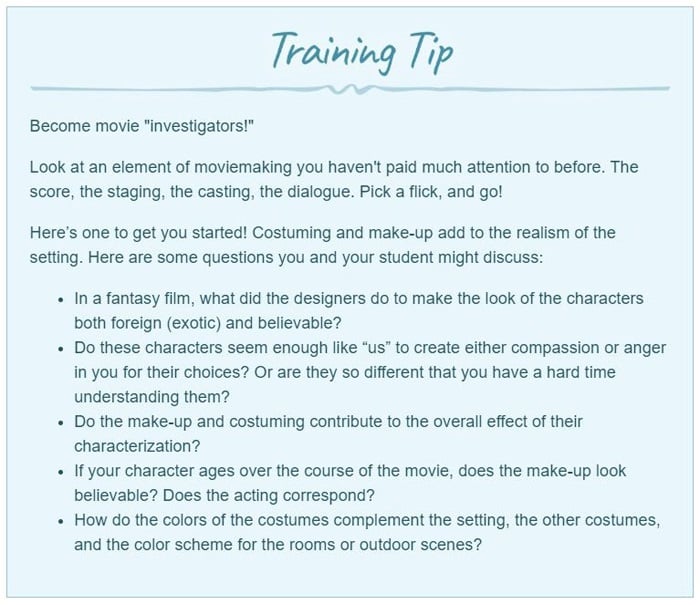Welcome to "Tea with Julie," a weekly missive by me, Julie Bogart. My wish is to give you food for thought over a cup of tea to enhance your life as an educator, parent, and awesome adult. Glad you're here. Pinkies up!
P.S. Was this email forwarded to you? Add yourself to the list and get your own!
Cincinnati, January 27, 2024
Hi Friend,
Have you ever experienced this? You added a regular movie night to your Brave Writer Lifestyle. You carefully selected a quality film you believed your child would enjoy. The credits have rolled, and the conversation goes something like this:
“What did you think?”
“I liked it.”
“What are your thoughts about the main character?”
“I liked her.”
“Did you have a favorite part?
“I don’t know. Could I play Minecraft now?”
The exchange feels stilted and forced. Instead of a Big Juicy Conversation, your child wants to bolt. Next time, keep the following tips in mind.
7 Ways to Encourage Natural, Lively Film Discussion
- Lead the way. If you get, “I don’t know,” for an answer then share your reactions. “It made me angry when…” “I had no idea that X would happen…” “Were you as shocked as I was that Y didn’t win?”
- Be specific. “What did you think?” is so open that some children aren’t able to pin down reasons. Instead try, “What surprised you the most?” and “Could you predict the ending? How did you know?!”
- Dig Deeper. When your child responds with a general, “I liked it,” you might say, “That’s cool. What did you like about it? The story? The songs? The animation? I liked…”
- Ask probing questions. “If a psychologist looked at the actions of Z what do you think he or she would say?”
- Encourage connection. “Do you relate to anyone in the movie, or do any of the characters remind you of someone you know? And, if so, how are they alike?”
- Seize the moment for retelling. Oral narrations can feel stiff and artificial when asked for. However, if the child is retelling to someone who hasn’t seen the movie, then the retelling springs from a natural place of wanting to share. So let’s say you watched a movie in the afternoon, when the non-homeschooling parent arrives home, ask over dinner, “We watched a great movie today. Who wants to tell Daddy or Mommy about it?”
- Don’t push it. Sometimes the best conversations happen a day or two later! Not everyone is prepared to discuss a film the moment the credits roll! Wait for the drive to the dentist or while washing dishes. Bring it up in light conversation and through memories of the film and see how it goes them.
The Bottom Line
Even without a discussion, movie viewing is valuable to your kids as a means of teaching them the structure of plot, characterization, setting, mood, theme, and more. Over time, these are all “going in” and you will find that your children will draw on those memories of movie-viewing to help them as they explore literary analysis in high school and beyond.
BONUS! Here's an additional tip:

Need more support? Brave Writer’s Movie Discussion Club gives students a place to jump online and type out their thoughts and opinions on pop culture. They’re having a blast—meanwhile, they are building academic writing skills.
Warmly,

P.S. Catch up on all the “Tea with Julie” emails here! Follow me on Instagram.
Julie Bogart
© 2024 Brave Writer LLC™
help@bravewriter.com

.